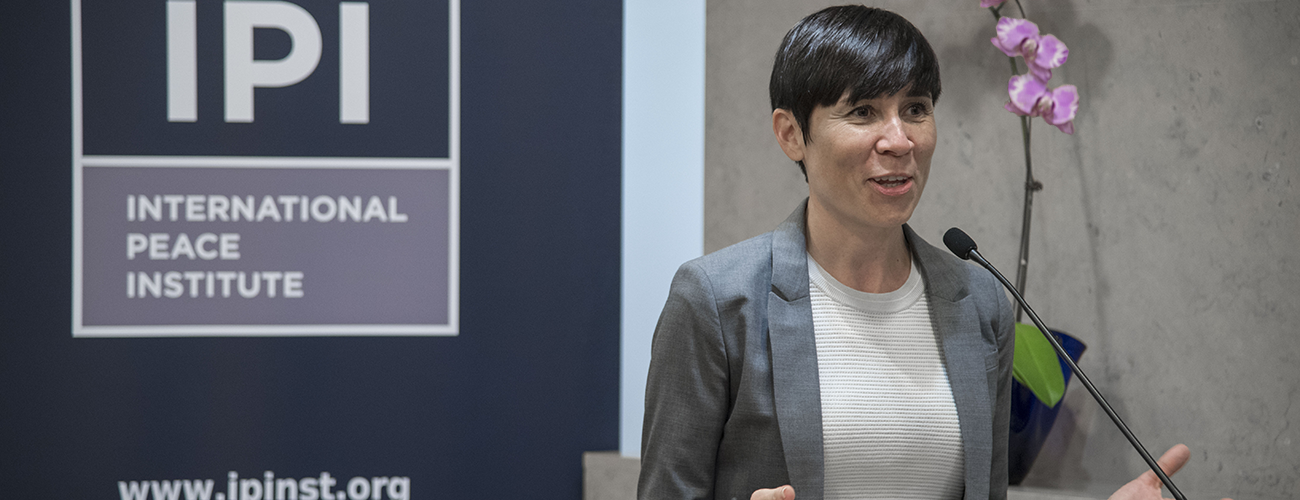Speaking from her experience as Norway’s Minister of Defence, Ine Marie Eriksen Søreide gave an ultimatum to an IPI audience May 19th. “We need UN peace operations to work, and work better,” she said.
The policy forum, “Plug and Play: Multinational Rotation Contributions (MRCs) for UN Peacekeeping Operations,” served as the launch event for a new report from the Norwegian Institute of International Affairs (NUPI) and IPI, which outlines key lessons learned about MRCs.
Ms. Eriksen Søreide explained that as “a small high cost nation” without “thousands of soldiers,” Norway must be strategic about how it contributes to UN peacekeeping to maximize its impact.
She cited her country’s MRC contribution of military aircraft as a good example of how small countries can make “smart contributions” and contribute to modernizing UN peacekeeping operations. She was also encouraged by an open meeting on MRCs that had enabled countries to coordinate in order to become more effective in their contributions.
In January 2016, Norway deployed a C-130 military transport aircraft to the UN mission in Mali (MINUSMA) that initiated a multinational rotation contribution (MRC) together with Portugal, Denmark, Sweden and Belgium. From the perspective of Troop Contributing Countries (TCCs), the MRC played an important role in reassuring these relatively small TCCs that they each had an exit strategy provided by the next rotation.
For MINUSMA, the C-130 MRC provided a predictable contribution to cover a much needed capability gap. Despite initial legal, administrative, and practical and operational challenges with this new type of multinational contribution, both the UN and TCCs involved have praised the initiative as an innovative approach to peacekeeping contributions.
Norway has been vocal in sharing UN Secretary-General Guterres’ vision for UN reform, Ms. Eriksen Søreide said, however it falls on member states to work with the Secretary-General to make change happen. “In my experience, there is no lack of ideas, but perhaps a lack of ability to implement them,” she said.
The report presents early lessons from the C-130 MRC in MINUSMA specifically, from the perspectives of the TCCs and the UN (Secretariat and field mission) respectively. It then considers the broader opportunities and challenges of MRCs for various peacekeeping capabilities beyond air assets. Finally, it makes recommendations for how to overcome some of the current legal, administrative, and practical as well as operational obstacles to realize the potential of such MRCs as a worthwhile and sustainable model, and looks at broader considerations for UN force generation.
The report concludes that the added-value of MRCs is highest where the capabilities provided by member states are identical or similar, where there is longer term commitment to sustaining the capability in the mission, and where there is significant infrastructure and support element by the MRC lead country that remains throughout the MRC.
Jean-Paul Deconinck, Force Commander, UN Multidimensional Integrated Stabilization Mission in Mali (MINUSMA), who just began in the job six weeks ago, noted, referring to the MRC for the C-130 in Mali, “I think we made a big step forward when it comes to mission planning. I don’t have to think about who comes next in supplying capabilities.”
Adrian Foster, Deputy Military Adviser, UN Department of Peacekeeping Operations, said that the plan for the C-130 aircraft “has opened our eyes to what is possible” with MRCs. The next step, he said, will be to develop similar plans for other assets.
He offered two personal ideas. Describing the first as “rapid deployment,” he asked, “Is there potential for this to have a number of like-minded nations with similar capability on standby, on readiness, and rotation on readiness to deploy, with ‘Plug and Play’ kicking in once they have deployed?”
Secondly, what he suggested was “role specialization, or capability specialization,” defined as “a number of members states coming together for something like casualty evacuation (CasEvac.)”
This echoes a recommendation of another IPI report, “Medical Support for UN Peace Operations in High-Risk Environments,” in which Lesley Connolly and Håvard Johansen call for medical evacuation (MedEvac) and CasEvac procedures to be simplified, decentralized, and made more flexible.
Jorge Torres, Military Adviser, Permanent Mission of Portugal to the UN, said that since his country’s 2014 return to peacekeeping, he’s seen improved coordination among UN members.
“We have a multinational force and we share a lot of capabilities,” he said. This, he said, is a “win-win” because “there is less logistical preparation, so the mission is smaller, making it a more economic and efficient experience for the UN and for all of us.”
The event was co-hosted by NUPI and the Mission of Norway to the UN.
Youssef Mahmoud, Senior Adviser, International Peace Institute, who moderated the discussion, concluded, “It’s amazing what you can achieve when you have predictability and flexibility on your side. Amazing what you can achieve when you don’t care who gets the credit.”








